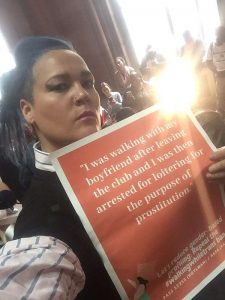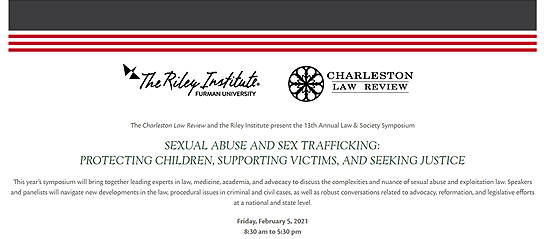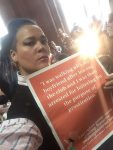February 3, 2021
After nearly fifty years of wreaking havoc on marginalized communities, the criminalization of loitering for the purpose of engaging in a prostitution offense was finally repealed in New York State. The statute, passed in 1976, is commonly referred to as the “Walking While Trans Ban” because law enforcement used it to unjustly target, harass, and arrest Black and Brown women and transgender women.
Impacted individuals, advocates, and allies celebrated a hard-fought victory after Governor Andrew Cuomo signed the repeal.
Those who have been arrested for loitering for the purpose of engaging in prostitution or “walking while trans” find it difficult, if not impossible, to find work or housing with this arrest on their record. In the decades-long campaign to repeal this discriminatory law, individuals articulated being arrested once for prostitution and then continually being targeted by police and arrested for “loitering” while they were on their way to the supermarket or the laundromat. One individual began carrying her marriage certificate with her while out with her husband in case she had to prove to police that she was with her partner and not soliciting.
DSW’s J. Leigh Oshiro-Brantly and Melissa Broudo collaborated with a broad coalition of advocates to repeal the law. Concurrent with the announcement of the repeal statewide, Brooklyn District Attorney Eric Gonzalez announced that his office would vacate more than 1,000 prostitution-related cases. Broudo appeared on News 12 Brooklyn to talk about this step in the right direction.
Contact with the criminal legal system traps individuals in a cycle of fines, jail, and court dates that can be difficult to escape. In cases where there is no victim, individuals should not be saddled with the burden of a record that prevents them from accessing housing, employment, and other opportunities. DSW applauds the New York State Legislature for recognizing that arresting individuals for loitering for the purpose of engaging in prostitution was discriminatory and unconstitutional.

DSW’s J. Leigh Oshiro-Brantly is pictured with a story from the Walking While Trans Coalition at the March 3 press conference. (Photo: DSW, 2020)
DSW Newsletter #23 (February 2021)
Hero of the Month: Miss Major Griffin-Gracy

A Victory Decades in the Making: New York Repeals the Walking While Trans Ban

The Truth About the Equality Model

DSW Staff Share Their Expertise

Mark Your Calendars

 Hero of the Month: Miss Major...
Hero of the Month: Miss Major...
 A Victory Decades in the Making:...
A Victory Decades in the Making:...
 The Truth About the Equality Model
The Truth About the Equality Model
 DSW Staff Share Their Expertise
DSW Staff Share Their Expertise
 Mark Your Calendars
Mark Your Calendars
